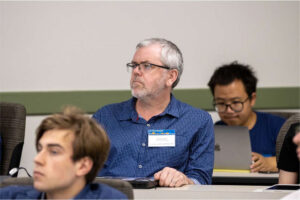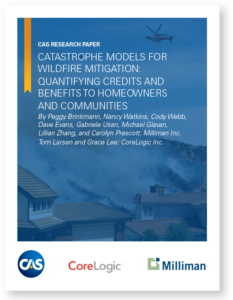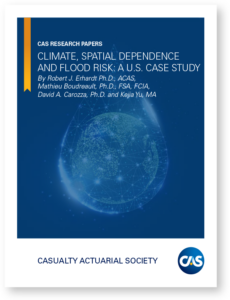
Discover the latest from CAS Research and what’s in store for the future.
As happens every year, we’ve done some interesting work for CAS research. We’ve looked at inflation, wildfires, floods, cannabis legislation, deep learning, new drivers in Saudi Arabia and more.
We’ll kick things off by taking a look at something I’m often asked about: Does the CAS work with other actuarial societies? It gives me great joy to say that we do! The CAS has regular meetings with our research counterparts at the Canadian Institute of Actuaries (CIA) and the Society of Actuaries (SOA).
We have supported several projects with the SOA, the most significant of which was a series of panel discussions looking at cyber risk. In this series, experts discussed the various ways that cyber attacks may harm consumers and businesses and how the industry can respond. We will soon publish work that explores the risk of smart homes, a paper about cryptocurrency and a report discussing “the new normal” for the insurance industry. Where interests align, our two organizations work to support one another to make high-quality research freely available to actuaries and stakeholders.

With the CIA, we published a paper at the beginning of the year that we first started discussing several years ago. The legal status of marijuana has changed over the past decade or so, most significantly when Canada decriminalized private use in 2018. This creates a natural experiment where we may examine the publicly available data on auto accident frequency and severity to gauge whether marijuana’s legal status has an impact. To discover what we concluded, you’ll want to have a look at the report “Assessing the Impact of Marijuana Decriminalization on Vehicle Accident Experience” by Vyacheslav Lyubchich. When reading that report, please note that the research explored the question of whether a change in legal status had an impact on auto accidents. It did not study whether marijuana use by an individual driver would affect the likelihood of accident frequency and severity.
By providing the same caliber of relevant, pragmatic content that actuaries in the U.S. see, we may enhance the CAS’s international brand.
Speaking of international research, as I write this article, we are reviewing several proposals to research the impact of IFRS 17 in the Asian market. This is a deliberate step to engage with the growing number of CAS members in that part of the world. We expect that by providing the same caliber of relevant, pragmatic content that actuaries in the U.S. see, we may enhance the CAS’s international brand.
Climate
 Last year I mentioned that we had received a final draft of a wildfire paper by Milliman and CoreLogic. I am happy to say that this CAS Research Paper has now been published. “Catastrophe Models for Wildfire Mitigation: Quantifying Credits and Benefits to Homeowners and Communities” is a very interesting work that explores the financial benefit of various risk mitigation techniques for homeowners. Consumers, the insurance industry, public policymakers and fire prevention professionals all want the same thing: fewer homes damaged by fire and a proper financial incentive to reduce risk. Insurance premium is where this second point becomes tangible. The work that Milliman and CoreLogic have done will be, we hope, a useful part of the conversations around how to move forward in everyone’s mutual interest.
Last year I mentioned that we had received a final draft of a wildfire paper by Milliman and CoreLogic. I am happy to say that this CAS Research Paper has now been published. “Catastrophe Models for Wildfire Mitigation: Quantifying Credits and Benefits to Homeowners and Communities” is a very interesting work that explores the financial benefit of various risk mitigation techniques for homeowners. Consumers, the insurance industry, public policymakers and fire prevention professionals all want the same thing: fewer homes damaged by fire and a proper financial incentive to reduce risk. Insurance premium is where this second point becomes tangible. The work that Milliman and CoreLogic have done will be, we hope, a useful part of the conversations around how to move forward in everyone’s mutual interest.
One of the stakeholders we engaged with was Frank Frievalt, former fire chief of the Mammoth Lakes Fire Protection District in California. His perspective was invaluable in guiding our efforts. For his part, he had this to say about working with actuaries:
 “Before 2016 I had never professionally worked with actuaries. Since then, they have become one of my primary resources, and the knowledge from those relationships has made me a better fire chief; I hope our fire service contributions to them will have reciprocal value.”
“Before 2016 I had never professionally worked with actuaries. Since then, they have become one of my primary resources, and the knowledge from those relationships has made me a better fire chief; I hope our fire service contributions to them will have reciprocal value.”
Earlier this year, we saw the release of another CAS Research Paper, “Climate, Spatial Dependence and Flood Risk: A U.S. Case Study,” that looks at this climate-adjacent issue. This paper was the result of four researchers, Rob Erhardt, ACAS, and Kejia Yu in the United States, and Mathieu Boudreault and David Carozza in Canada. (Are we noticing a pattern about collaboration across borders and societies?) Most of the data is publicly available (see the paper’s Section 2 for a partial list), so actuaries may explore the results for themselves.
Inflation
Are you thinking about inflation? We are! Among other work, we have released two Research Papers by CAS Fellows Jim Lynch and Dave Moore that view inflation from a reserving perspective. Lynch and Moore have examined publicly available data from Schedule P, which they use to detect changes in link ratios on a calendar-year basis. This is compared to core inflation, and we find that the recent past has seen increases that are beyond your average, run-of-the-mill inflation. Social inflation? Perhaps not in full, perhaps not at all, but certainly something that your organization can review. You can find the Research Paper “Social Inflation and Loss Development” and its “Update” under Publications on the CAS website.
Jim Lynch has been very busy this year, and you’ll be able to hear from him directly in this and future issues of Actuarial Review. Some of us can recall the late 1970s and early 1980s when inflation in most countries was meaningfully higher than it is today. This generated a number of papers, one of which was written by Robert Butsic and published in 1982. Lynch takes a look back at how that research holds up and what lessons it has for today’s practicing actuaries — some of whom weren’t even born when Butsic wrote it! (See Lynch’s article on Butsic’s paper in this AR’s Actuarial Expertise Department.)
 Research working groups
Research working groups
We have a number of standing research working groups that support research call paper programs and requests for bespoke research. The Risk Working Group continues to look at the simulation of individual claims for reserving. The Spring 2023 E-Forum features the culmination of the Ratemaking Working Group’s biannual call for ratemaking papers (see next subheading). This working group is also looking to initiate research on convective storms and large language models. The Reserves Working Group is working on projects that examine expense reserving, Bayesian models for reserving and predictive analytics for case reserving. The Reinsurance Working Group has published two call papers in the Summer 2023 E-Forum, is finalizing an RFP and is starting a series of articles that give an overview of various reinsurance lines of business.
Actuarial Research Conference

In early August, I was in Iowa for the 58th Actuarial Research Conference, hosted by Drake University. In addition to reconnecting with colleagues and friends, I was glad to share the stage with Peng Shi, ACAS, who presented a summary of his prize-winning Ratemaking Call Paper, “Nonlife Insurance Risk Classification Using Categorical Embedding.” We are all aware that categorical data is ubiquitous in insurance pricing applications: territories, class codes, Standard Industrial Classification (SIC) codes, agents, size categories, etc. The list is vast. These distinctions are important for the operations of an insurance company, but they’re very difficult to model. Peng Shi, along with his co-author Kun Shi, demonstrate how a deep network may translate those categorical variables into continuous variables that may be modeled more easily.
For my part, I gave an overview of the CAS organizational structure, with an emphasis on the CAS Research Council and its responsibility for supporting the standing research working groups. CAS Chief of Advocacy Ken Williams, FCAS, conducted a session on exam changes, and University of Texas professor Alisa Walch, FCAS, talked about the CAS summer program. Both sessions were well attended.
Rounding out the year
In just a few weeks, we will launch this year’s individual grant proposal process. At the 2023 Annual Meeting, we expect to announce the winner of this year’s Hacktuary contest. By the end of the year, we intend to finish the analysis of the third annual Actuarial Technology Survey.
This is a quick view of some of the work that CAS research is doing. There’s plenty more where this came from!













